Echoes of Uhud: The Mountain that Loves Prophet ﷺ and Loved by Him
Jabal Uhud maintains an emotional connection with our beloved Prophet Muhammad (ﷺ). Just as the trunk of the palm tree wept from longing for the Prophet, Jabal Uhud, too, held a deep and emotional bond with him. The Prophet (ﷺ) once said, "This is a mountain that loves us, and we love it" (هَذَا جَبَلٌ يُحِبُّنَا وَنُحِبُّهُ), (narrated by Anas ibn Malik - Sahih al-Bukhari).
Scholars such as Ibn Abd al-Barr have reflected on the hadith, pondering whether the mountain itself, by divine will, was given the ability to feel and express love for the Prophet (ﷺ), or if it was a metaphor for the deep connection between the believers and the mountain. Some scholars even refer to it as a living companion (sahabi) of the Prophet (ﷺ). Every time we approach Jabal Uhud, we feel the same love that the Prophet (ﷺ) spoke of. The very rocks seem to pulse with affection, standing as a witness to the sacrifice of those who walked its slopes to protect the faith.
Nestled just north of Medina, this mountain is much more than a geographical feature. It is a living symbol of love, faith, sacrifice, and the unshakable bond between the Prophet Muhammad (ﷺ) and his Companions. When I stood underneath Jabal Uhud a few months ago, the weight of history, love, and sacrifice was palpable in the air. It felt as though the mountain itself whispers tales of its connection with the Prophet (ﷺ), of battles fought, lives lost, and faith solidified over time.
Jabal Uhud is most renowned for being the site of the Battle of Uhud, an important battle in early Islamic history. The Prophet (ﷺ) and his followers were defending their nascent community against the Quraysh. Despite an initial victory, a sudden counterattack led by Khalid ibn al-Walid—who had not yet embraced Islam—resulted in a temporary setback.
The Prophet Muhammad (ﷺ) was injured during the fierce encounter at Uhud. Utbah ibn Abi Waqqas, a member of the Quraysh, hurled stones at the Prophet (ﷺ), injuring his lips. Worse yet, an arrow launched by Utbah pierced the Prophet's cheek, breaking his tooth. Abdullah ibn Shihab al-Zuhri inflicted a wound on the Prophet's forehead. Ibn Qami’a struck the Prophet's face, causing two rings from his helmet to penetrate his cheek. The Prophet (ﷺ) also fell into one of the pits dug by Abu Amir to trap Muslims. Ali ibn Abi Talib helped lift the Prophet (ﷺ) by the hand, and Talha ibn Ubaydillah supported him to stand.
As he wiped the blood from his face, the Prophet (ﷺ) reportedly said, "How can a nation be successful when they have injured their Prophet?" (Sahih Muslim).
At that critical moment, with a force of 150 Quraysh soldiers closing in, the Prophet Muhammad (ﷺ) found himself with only a small group of nine companions. Realizing that their only chance was to retreat, the Ansar, who were familiar with the landscape, likely led the group toward a hidden crevice in the mountain. This narrow opening was barely large enough for two people to shelter in. It was here that the Prophet (ﷺ) took refuge while Talha ibn Ubaydillah and Sa'd ibn Abi Waqqas, skilled archers and warriors, began launching volleys of arrows to protect the Prophet (ﷺ) from the Quraysh soldiers trying to locate him.
Soon after, the scattered Companions returned, rushing to the Prophet's (ﷺ) defence. Abu Bakr arrived and saw a lone warrior fighting fiercely to protect the Prophet (ﷺ), and he prayed, "O Allah, let it be Talha." Indeed, it was Talha ibn Ubaydillah, standing as a shield for the Prophet (ﷺ), just as he had promised. As more Companions arrived to assist, they found two arrows embedded in the Prophet's helmet. Abu Bakr and Abu Ubaydah were among the first to aid him. Abu Ubaydah, out of his immense love for the Prophet (ﷺ), used his teeth to dislodge the arrows, breaking his own teeth in the process. This act of selfless love remained with Abu Ubaydah for the rest of his life, and his broken teeth became a testament to his loyalty to the Prophet (ﷺ).
Malik ibn Sinan (the father of Abu Sa'id al-Khudri) sucked the blood from the Prophet’s wounds and swallowed it. In response, the Prophet (ﷺ) said, "Whoever's blood touches mine, the fire will not touch him.
This very location, the crevice of Jabal Uhud, witnessed a remarkable exchange between the Companions and Abu Sufyan, who, at that time, was still a staunch opponent of Islam. Standing in the pride of victory, Abu Sufyan called out, "Exalt Hubal!"—the Quraysh's chief idol—proclaiming what he believed was a triumph for their false gods. The Prophet (ﷺ), bleeding and injured, instructed his Companions to respond firmly: "Allah is higher and more exalted!" (الله أعلى وأجل), reaffirming the ultimate supremacy of Allah over all.
What makes this place particularly special for me, apart from its historical significance, is the lingering scent that still emanates from the crevice. Many visitors, including myself, have experienced the fragrance of musk in this very spot. It was a deeply personal and spiritual experience for me. The scent seemed to connect me to the Prophet's (ﷺ) presence, reminding me of the hadith narrated by Anas ibn Malik, who said, "I have never smelled a fragrance more pleasant than the scent of the Prophet, neither musk nor amber."
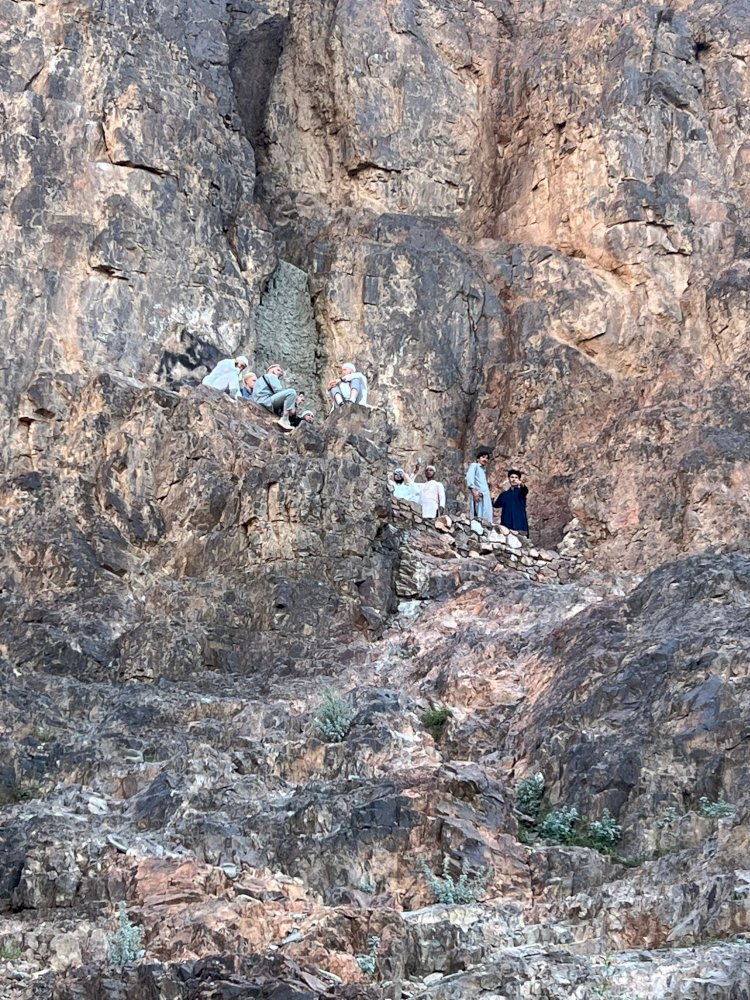
This unique trait of the Prophet (ﷺ) is further documented in hadith collections such as those of Abu Ya'la and Al-Bazzar, where it is narrated that whenever the Prophet (ﷺ) passed through a path, those who followed would know he had been there by the lasting scent of perfume. They would say, "The Messenger of Allah (ﷺ) has passed through this path."
A lady serving tea for the visitors under the foothills of Uhud shared an interesting tradition: she mentioned that the scent of musk mysteriously envelops the area every Thursday and Monday night.
Two hadiths came to mind in connection to the unique fragrance I experienced. The first is the hadith narrated by Abu Huraira: "No one is wounded in the path of Allah except that on the Day of Resurrection, the wound will bleed, and the colour of the blood will be that of blood, but its fragrance will be that of musk." (Agreed upon by al-Bukhari and Muslim). This powerful hadith highlights how those who sacrifice in the path of Allah are honoured even in the Hereafter, their wounds emitting a divine fragrance like musk as a reward for their commitment and sacrifice. Every rock, every crevice of Jabal Uhud stands as a witness to these sacrifices, as though the mountain itself carries the scent of these martyrs' dedication, especially as it accepted the noble blood of the Prophet himself.
The second hadith that later connected my heart to Uhud was the saying of the Prophet (ﷺ): "Uhud is one of the mountains of Paradise" (أُحُدٌ رُكْنٌ مِنْ أَرْكَانِ الجَنَّةِ), further cementing the mountain's spiritual stature. To contemplate that this mountain, so loved by the Prophet (ﷺ), is also a piece of Paradise on earth is truly awe-inspiring. Walking along its slopes, one can almost feel the connection between this world and the next—a reminder of the fleeting nature of life and the eternal reward that awaits the faithful.
Another powerful event tied to Jabal Uhud is when the Prophet Muhammad (ﷺ) ascended the mountain accompanied by Abu Bakr, Umar, and Uthman. As they stood on its slopes, the mountain began to tremble beneath their feet. The Prophet (ﷺ) gently struck the mountain with his foot and said, "Be firm, Uhud, for upon you are a Prophet, a truthful one, and two martyrs." This statement was a prophecy foreshadowing the future martyrdoms of Umar and Uthman, which became a reality in the years to follow. This moment, recorded in various narrations, reflects the deep spiritual bond between the Prophet (ﷺ) and Jabal Uhud.
In that trembling moment, it was as though the mountain itself recognized the weight of righteousness standing upon it—the Prophet (ﷺ), Abu Bakr, Umar, and Uthman—figures of immense significance in Islam. This connection between the mountain and these luminaries of Islam reminds us that even the natural world reacts to the presence of righteousness and divine purpose. It is as though the mountain, standing firm for centuries, remains a silent witness to the truth.
The Prophet's (ﷺ) connection with Uhud extended further. He often used the immense size of Jabal Uhud as a metaphor to teach key spiritual lessons. One such lesson was about the weight of faith and deeds in the sight of Allah. When the Companions once laughed at the thin legs of Abdullah ibn Mas'ud, the Prophet (ﷺ) reminded them, "The legs of Abdullah ibn Mas'ud are heavier on the scales than Mount Uhud on the Day of Judgment."
Similarly, the Prophet (ﷺ) used the mountain as a symbol of the fleeting nature of wealth. He once said, "If you had as much gold as Mount Uhud and spent it in the way of Allah, it would not be accepted from you until you believed in destiny."
In another hadith, the Prophet (ﷺ) emphasized his disdain for accumulating wealth without purpose. He said, "What would please me is not that I have gold the size of Mount Uhud, but rather that I die with only a dinar or half a dinar left, except that I used it to repay a debt."
In reflecting on Jabal Uhud, it's impossible not to feel a deep sense of reverence. This mountain, which bore witness to some of the most critical moments in early Islamic history, is a living reminder of the love, sacrifice, and resilience that defined the Prophet Muhammad (ﷺ) and his Companions.
Disclaimer
The views expressed in this article are the author’s own and do not necessarily mirror Islamonweb’s editorial stance.

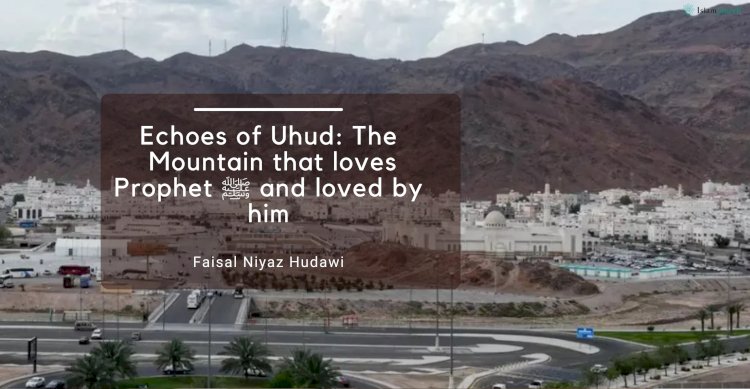



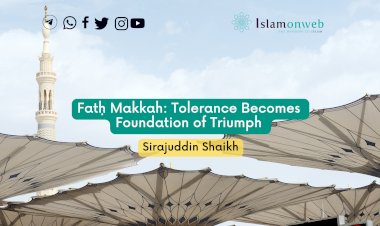
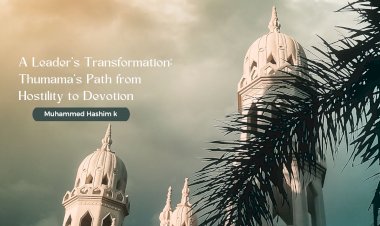
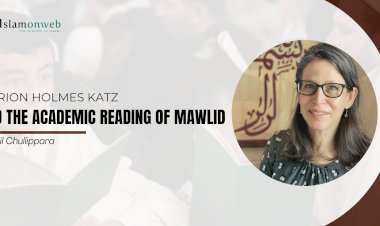

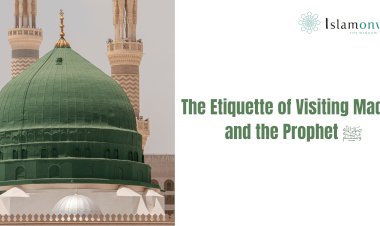
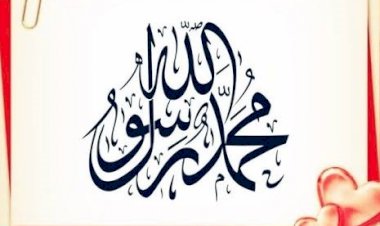














Leave A Comment